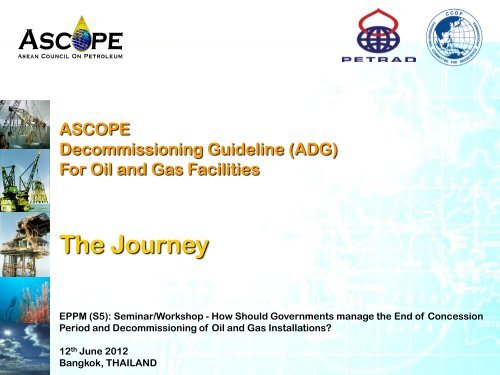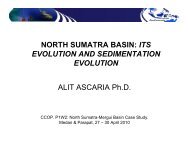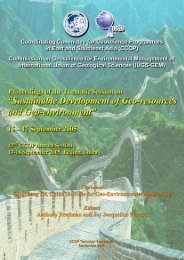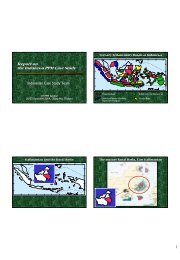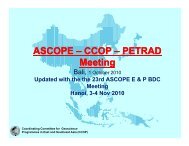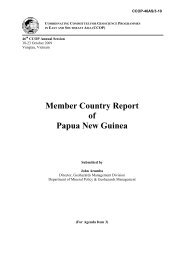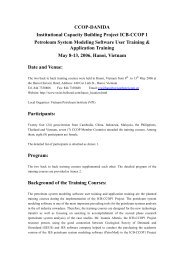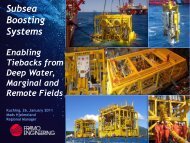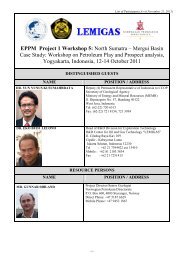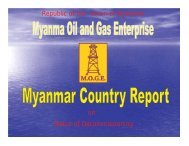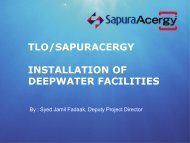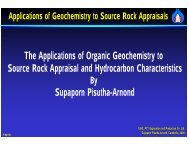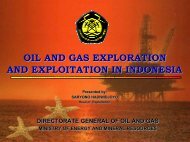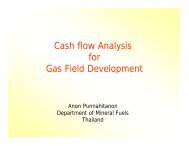ASCOPE Decommissioning Guideline - CCOP
ASCOPE Decommissioning Guideline - CCOP
ASCOPE Decommissioning Guideline - CCOP
Create successful ePaper yourself
Turn your PDF publications into a flip-book with our unique Google optimized e-Paper software.
<strong>ASCOPE</strong><br />
<strong>Decommissioning</strong> <strong>Guideline</strong> (ADG)<br />
For Oil and Gas Facilities<br />
The Journey<br />
EPPM (S5): Seminar/Workshop - How Should Governments manage the End of Concession<br />
Period and <strong>Decommissioning</strong> of Oil and Gas Installations?<br />
12 th June 2012<br />
Bangkok, THAILAND
TABLE OF CONTENTS<br />
Objectives<br />
Background<br />
The Roadmap<br />
Challenges<br />
Where We Are Now<br />
Next Steps<br />
Q&A<br />
2
OBJECTIVE<br />
To share the history and challenges in formulating the ADG, where we<br />
are today and what should and can be done by ASEAN member<br />
Countries.<br />
3
<strong>ASCOPE</strong><br />
The ASEAN Council on Petroleum (<strong>ASCOPE</strong>) is the association of national oil companies in the<br />
ASEAN region. Established on October 15, 1975 in Jakarta, Indonesia. To support member<br />
countries increase their capabilities, through mutual assistance, in all aspects and phases of the<br />
petroleum industry.<br />
4
BACKGROUND – Why & How It Started<br />
The 15 th E&P BDC Meeting in September 2006 noted that:<br />
<br />
<br />
<br />
<br />
54% of the installed platforms/offshore structures are more<br />
than 20 years old.<br />
A collaboration to seek “unconventional” ways of<br />
decommissioning could benefit <strong>ASCOPE</strong> Members<br />
Could potentially be done through study under United<br />
Nations funding (Environmental/Pollution Plan)<br />
Gives opportunities for <strong>ASCOPE</strong> E&P BDC to explore an<br />
option for developing strategic plans or share resources for<br />
decommissioning activities.<br />
5
BACKGROUND – Why & How It Started<br />
The 16 th E&P BDC Meeting in May 2007 noted:<br />
<br />
<br />
<br />
The decommissioning technology study under United Nations<br />
funding (environment/pollution plans) was unlikely to be<br />
achieved.<br />
<strong>ASCOPE</strong> Member Countries would cooperate to come up<br />
with regional convention decommissioning reference<br />
document in parallel with accepted international policies<br />
with technical assistance from Petrad.<br />
Each <strong>ASCOPE</strong> Member Country would formulate its own<br />
decommissioning guidelines.<br />
6
BACKGROUND – How It Started<br />
In the 17 th <strong>ASCOPE</strong> BDC meeting held in September 2007:<br />
<br />
<br />
Malaysia proposed to have regional effort to look for<br />
unconventional technology and share resources for cost<br />
effective decommissioning.<br />
<strong>ASCOPE</strong> Member Countries would cooperate to come up<br />
with regional convention decommissioning reference<br />
document in parallel with accepted international policies for<br />
<strong>ASCOPE</strong> Member Countries with technical assistance from<br />
Petrad.<br />
<br />
Thailand proposed to have common decommissioning<br />
guidelines.<br />
7
BACKGROUND – How It Started<br />
In the 18 th <strong>ASCOPE</strong> BDC meeting, PETRAD conducted a 1-day<br />
workshop to set the scene for the establishment of a regional<br />
guideline similar to OSPAR.<br />
The 19 th <strong>ASCOPE</strong> BDC meeting in August 2008 in Kuala Lumpur:<br />
• Formed an ADG Task<br />
• Terms of Reference<br />
• Roadmap was formulated to kick-start the effort. The<br />
roadmap targetted a 2-year duration with completion at the<br />
end of 2010.<br />
8
BACKGROUND – revised Roadmap June 2009<br />
ADG Roadmap – June 2009<br />
<br />
<br />
2008<br />
“Setting The Scene”<br />
Collaboration with<br />
PETRAD & <strong>CCOP</strong> as<br />
consulting bodies<br />
Sourcing of international<br />
references wrt<br />
decommissioning<br />
2009<br />
“Building The<br />
Momentum”<br />
Consensus on the Roadmap<br />
Establish dedicate <strong>ASCOPE</strong><br />
taskforce<br />
E&P BDC sanction for the<br />
Terms of Reference<br />
Sharing of historical data<br />
Leveraging with PETRAD &<br />
<strong>CCOP</strong> as consulting body for<br />
benchmarking with other<br />
regions<br />
Quarterly taskforce meeting<br />
Drafting of <strong>Guideline</strong> for<br />
review and comments<br />
• Establishment of country chapter<br />
• Sourcing of national and state<br />
legislations wrt decommissioning<br />
• Participation in decommissioning<br />
conferences e.g. NPF, North Sea<br />
Conference, GOM<br />
• Consultation with the technology<br />
providers wrt heavy lifting,<br />
underwater cutting,<br />
environmental monitoring/<br />
remediation<br />
• Consultation with certification<br />
bodies and yards wrt salvage,<br />
reuse & refurbish options<br />
• Consultation with National Oil<br />
Companies<br />
2010<br />
“Completion<br />
Processes”<br />
Issuance of <strong>ASCOPE</strong><br />
<strong>Decommissioning</strong><br />
<strong>Guideline</strong> draft<br />
EPBDC sanction for the<br />
ADG draft<br />
NCM endorsement of ADG<br />
draft & funding<br />
Selection of Technical<br />
Author/Editor<br />
Fine tuning legal<br />
requirements<br />
Legend<br />
2011<br />
“Completion”<br />
Award TWE contract<br />
• Proofing of ADG<br />
• Approval of ADG by<br />
EPBDC & NCM<br />
• Printing of ADG<br />
• Issuance of ADG<br />
• Sharing of <strong>ASCOPE</strong><br />
<strong>Decommissioning</strong><br />
<strong>Guideline</strong> on <strong>ASCOPE</strong><br />
website<br />
• Road shows to all member<br />
countries to promote the<br />
new guideline<br />
• Establishment of regional<br />
bridging document<br />
guideline<br />
<strong>ASCOPE</strong> Taskforce<br />
Country Chapter<br />
To be decided by EPBDC<br />
92
BACKGROUND – Current Contents<br />
1 INTRODUCTION<br />
2 INTERNATIONAL DECOMMISSIONING LAW AND REGULATIONS<br />
3 TECHNICAL DECOMMISSIONING & DISPOSAL OPTIONS<br />
4 PLANNING FOR DECOMMISSIONING<br />
5 IMPACT ASSESSMENT<br />
6 RESIDUAL LIABILITY IN DECOMMISSIONING<br />
8 REFERENCES<br />
10
CHALLENGES – ADG Crafting<br />
Managing expectations<br />
Lack of expertise or different levels of technical proficiency<br />
Non-dedicated country representative resulting in discontinuities<br />
Movement of <strong>ASCOPE</strong> Secretariat from Kuala Lumpur to Manila<br />
Aborted contracting<br />
Lack of perspective that the effort is part of a larger regional<br />
framework as espoused by UNCLOS Art 123<br />
11
WHERE WE ARE NOW<br />
The ADG is now to become the high level document common to all<br />
<strong>ASCOPE</strong> Member Countries.<br />
The ADG is in the final stages of editing.<br />
The short term plan is geared up to for launching in November 2012.<br />
This will be followed up with sharing of the ADG as and when<br />
required.<br />
The ADG effort has been quoted from a regional (legal) perspective.<br />
12
NEXT STEPS<br />
Execute the short term plan to achieve launching in November 2012.<br />
Sharing of the ADG as and when required in all <strong>ASCOPE</strong> Member<br />
Countries as and when required.<br />
Each member country is expected to either link their current procedures<br />
with the ADG or formulate new procedures as required.<br />
<strong>ASCOPE</strong> E&P BDC to explore option for developing strategic plans or<br />
share resources for decommissioning activities as expressed in 2006.<br />
Elevate placement of the ADG to satisfy UNCLOS Article 123 provision?<br />
13
Q & A<br />
14
Thank You<br />
15
ASEAN ACRONYMS<br />
AEBF : ASEAN Energy Business Forum<br />
AEM : ASEAN Economy Ministers<br />
AFOC : ASEAN Forum on Coal<br />
AMEM : ASEAN Ministers of Energy Meeting<br />
AMM : ASEAN Ministerial Meeting<br />
AMMST : ASEAN Ministerial Meeting on Science & Technology<br />
ASC : ASEAN Standing Committee<br />
<strong>ASCOPE</strong> : ASEAN Council on Petroleum<br />
COST : Committee on Science & Technology<br />
EE&C SSN : Energy Efficiency and Conservation Subsectoral Network<br />
HAPUA : Heads of ASEAN Power Utilities/ Authorities<br />
NRSE SSN : New & Renewable Energy Source of Energy Subsectoral Network<br />
SG : Secretary General<br />
SOM : Senior officials Meeting<br />
SOME : Senior Officials Meeting on Energy<br />
17


